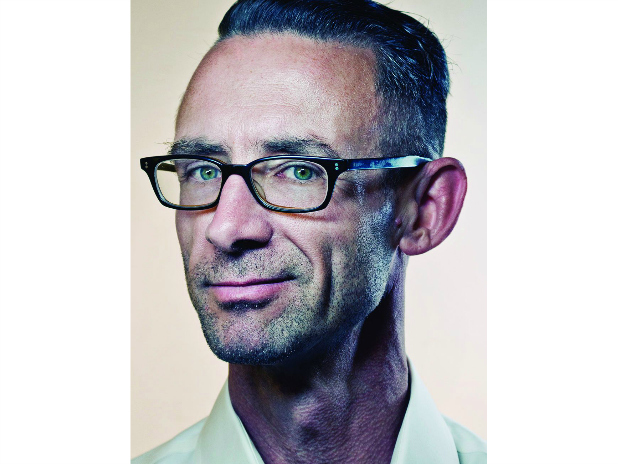A Man Worth Listening to: Chuck Palahniuk

The first rule of interviewing Chuck Palahniuk is: you talk about Fight Club. Of course you do. The author’s era-defining novel-turned-movie, which stirred much debate over the crisis of masculinity in the late ’90s, still inspires obsessive analysis to this day. So it’s shocking that Palahniuk has decided to break the first rule of a cult classic: don’t risk sullying its legacy by adding to it. He’s penned both a Fight Club prequel — a short story, “Expedition,” in his new book Make Something Up: Stories You Can’t Unread — and an upcoming sequel, Fight Club 2, in the form of a graphic novel. If it ain’t broke, keep beating it into a bloody pulp.
Of course, Palahniuk’s done other things over the past couple decades. His confrontational writing style has fuelled 13 more best selling novels, several of which (Choke, Rant, Invisible Monsters) have become movies. But it’s still the swaggering gospel of Tyler Durden, the Fight Club narrator’s übermensch alter ego who critiques our capitalist-driven society for erasing men’s sense of masculinity, that strikes the sharpest nerve with a generation of disaffected dudes around the world. Reports of real-life fight clubs still pop up. Academic articles inspired by the book, on topics like “the feminization of American culture,” are still published regularly. People haven’t stopped breaking the first rule of Fight Club — they talk about it constantly. Palahniuk knows this. So he’s doing it too.
So, a Fight Club prequel and a sequel? That’s ballsy. Haven’t you seen The Phantom Menace? Or Speed 2? Your legacy is at stake here.
You know, I never thought I’d have to talk about Fight Club for the rest of my life. So I thought I should expand the story. Because, as it is, it’s a limited subject. And also, because the book really trashes fathers. So I wanted to see the narrator, 10 years later, as a father himself, doing an even worse job than he had perceived his own father doing. I didn’t want him to get away so scot-free. And because Fight Club had a happy ending, and I really don’t believe in happy endings. I think that the moment after that happy ending just comes more bullshit.
And by more bullshit, you mean more Tyler Durden?
Well, writing the sequel, I didn’t want Tyler to just be this unexplained aberration that occurred at this magic moment in this man’s life. I wanted to have flashbacks in the sequel, the graphic novel, where we’d see Tyler playing the same role in the lives of the narrator’s father, his grandfather and his great grandfather. He’s been the best friend that’s been unspoken about in every generation of his family. The narrator even knew Tyler as a child. And in the sequel, he realizes his own child knows things that only Tyler could’ve told him.
Do you think all men are doomed to replay their fathers’ lives?
I don’t think so. But I think that if you come from a family where the father has been absent for several generations, then there are very few fathering skills left. Very little to pass on. My father never knew his father. I can forgive him for not being the ideal father because he really didn’t have any model in his life. Once it’s gone for a few generations, it’s tough to bring it back.
Fight Club had a happy ending, and I really don’t believe in happy endings. I think that the moment after that happy ending just comes more bullshit.
In Fight Club, you wrote about the absence of male role models in our society. Do you still see this problem today?
I’d say it’s worse now. Joseph Campbell, the anthropologist, used to talk about the role of the secondary father. There’d be the biological father, who could take the son to a certain point in development, but after that there had to be a teacher or a clergyman or a drill sergeant or a coach, some secondary father who wasn’t related to the son, who could discipline the son to adulthood. But those secondary fathers are really dropping by the wayside. People really don’t think about priests in a nurturing way anymore. Males are leaving teaching and there’s just so much nervousness around sexual predation that secondary fathers are just avoiding that role.
So what’s a boy to do?
Well, once the vacuum is there, and has been there for generations, then you get Tyler Durden — a kind of fascist, charismatic leader who steps in and says, “You don’t know what to do. So do this.” Tyler is pretty much the universal trickster character. In Norse mythology that was Odin, in Greco-Roman mythology it was Hermes, in Native American culture it was Coyote. Every culture has a kind of trickster character that comes in and stirs the shit and upsets people, but also brings them enlightenment.
You recently pointed to the fact that Fight Club is taught in universities as a sign of the lack of new social models for men in literature nowadays. Can you expand on what you meant by that?
Well, the last unique social model I remember that showed men coming together to talk about their experiences was Dead Poet’s Society. And it’s so similar to Fight Club because it’s about a charismatic guy who comes into a group and he reminds all these guys about their mortality. He says, ‘You are going to die.’ And he gives them a kind of model for going underground at night, but instead of fighting, they just read poetry. In a way, Dead Poet’s Society was Fight Club lite. But since then, I’ve not really seen any new books or media depicting social models for men to get together and talk about or process their stuff. At the same time, I’ve seen dozens of terrific books about women getting together. Divine Secrets of the Ya-Ya Sisterhood, Joy Luck Club, How to Make An American Quilt — these are all big, successful novels, and they all depict women coming together in a process that allows them to talk about their experience with their peers. I think Fight Club is one of the very few male social model pieces of media that’s been around. That’s why it’s taught. There’s just not a lot of competition.
Why do you think there’s such a dearth of material dealing with men’s issues?
Because men don’t read. Reading’s no longer a guy thing. There are a million forms of media that serve guys better than books — gaming, porn, sports, television. If the audience is not there, what’s the point of writing those things? There’s not a lot of money to be made there.
Men don’t read? But men are reading this! To be fair, though, a lot of my guy friends don’t read books.
There’s a whole school of thought about this. There’s a fantastic book called The Program Era by Mark McGurl. It’s about how writing workshops, and graduates of writing programs, have shaped fiction since the 1940s. Its kind of blunted fiction, made it less extreme and more banal. People are writing for these standardized workshop ideals that makes everybody in the workshop happy and gets you an A. The most extreme writing is excluded from these workshops.
Yeah, a lot of your work veers towards the extreme and gruesome. Why?
Well, I think there’s just so much banality in our popular culture. I turn on the television and I’m not really surprised or shocked by anything. Everything is so watered down to appeal to the largest audience possible, so that the sponsor can sell as many products as possible. I can be bored with everything else in the world. I don’t want to be bored by what I do for a living.
You mentioned earlier that you don’t believe in happy endings. But in Make Something Up, the story “Zombie” took me by surprise. It starts off with your typical dark humour and cynicism, only to reject all that in favour of tear-jerking optimism: existential bliss brought forth by a sense of community.
Last year, I made a New Year’s resolution that every story I wrote was going to have a happy ending. Initially, “Zombie” ended with the narrator sitting in a toilet stall lobotomizing himself. The end. And then I carried it around for a couple weeks and I thought, “You know, that’s bullshit. I can take this story further.” I wasn’t very good at happy endings. I’d gotten really good at conflicted, sad endings. I think it’s like a muscle; you’ve got to build it up.
So what does this mean? Do you have hope for our generation after all? Is there a happy ending in store for us?
(Laughs). Sorry, I’m not going to fall into the trap of social engineering. I’m just going to write my stories. I just think things are better than they’ve ever been. People need to recognize that. Our ancestors dealt with much worse shit than we do. We need to recognize the gifts we’ve been left with, and be a little more grateful. Do a little more with them. Quit whining.










